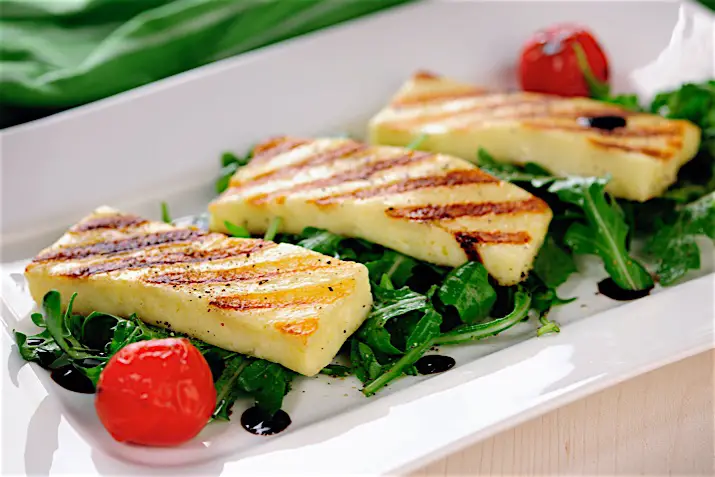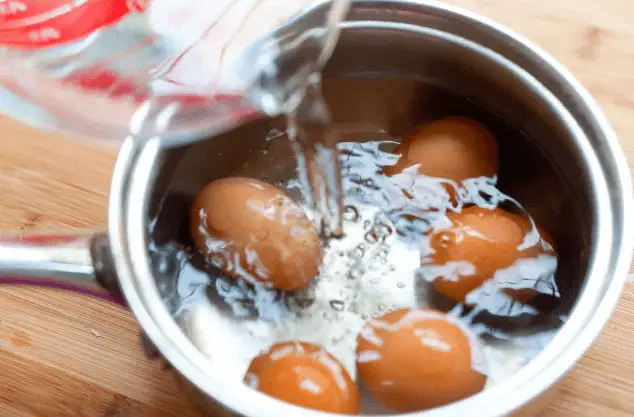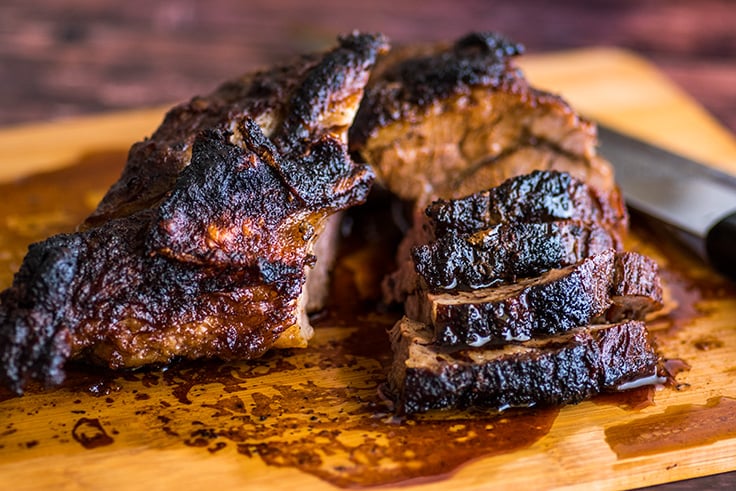Halloumi cheese is a traditional Cypriot cheese that has become popular all around the world due to its unique taste, texture, and versatility in cooking. This semi-hard, white cheese is made from a mixture of goat and sheep milk, sometimes with the addition of cow’s milk. Its salty flavor and rubbery texture make it an excellent ingredient for salads, sandwiches or even as a main dish. However, like any other food item, halloumi doesn’t last forever. In this article, we will discuss how long halloumi lasts after cooking and ways to improve the shelf life.
Understanding Halloumi Cheese
Origin And History Of Halloumi Cheese
Halloumi cheese originated in Cyprus and has been produced there for centuries. It is a fundamental component of the traditional diet on the island. Recently it has gained popularity around the world, with its production now widely spread across many countries.
Characteristics Of Halloumi Cheese
Halloumi cheese has a unique taste of saltiness due to its brine-curing process and aging techniques. Its texture is rubbery when raw but becomes slightly softer when cooked at high temperatures such as grilling or frying. The cheese gives a characteristic squeak when eaten fresh.
Making Process
To make halloumi cheese, fresh goat or sheep milk is warmed up until curdled using rennet or other enzymes to form solid blocks of cheesecloth-wrapped curds that are then pressed into shape under weights until they reach a firm consistency.
Factors That Affect The Shelf Life Of Cooked Halloumi Cheese
Several factors impact the shelf life of cooked halloumi cheese. Let’s take a brief look at each one:
Temperature And Humidity
Temperature influences spoilage rates; therefore keeping your cooked halloumi (whether sliced or diced) below room temperature slows down bacterial growth and extends shelf life substantially.
Packaging Materials
Proper packaging helps maintain halloumi cheese’s freshness and quality. Sealing, wrapping or storing cooked halloumi in an air-tight container can prevent bacterial growth and food poisoning.
Preparation Method
The cooking method you use can impact the cheese’s shelf life. Grilling or frying non-brined halloumi cheese at high temperatures helps preserve it longer than raw, brined halloumi. Additionally, hot-smoked or cold-smoked varieties of halloumi last longer than unsmoked ones.
Shelf Life Of Cooked Halloumi Cheese In Different Storage Conditions
Refrigeration Storage
Refrigeration is the easiest way to extend the shelf life of cooked halloumi for up to seven days. Here are some tips on how to store your cooked halloumi in the fridge safely:
- Keep it wrapped tightly in plastic wrap to avoid drying out.
- Place it at the back of the fridge which maintains a temperature constant of 37°F (3°C) instead of overloading food on top of it.
- Avoid storing cooked halloumi with vegetables because it may cause them to wilt prematurely due to increased exposure to moisture from the cheese’s brine.
If you decide to refrigerate your cooked Halloumi pieces, make sure they’re not drenched with salty brine juice, as this will eventually dry them out and negatively affect their taste when reheated.
Freezing Storage
Freezing might be another viable option for extending your Hallomi longevity; however, there are a few things you may want to consider about freezing before deciding this method:
Can You Freeze Cooked Halloumi Cheese?
Yes, you can freeze cooked Hallomi cheese; however, freezing affects its texture compared to fresh varieties. When thawed, previously frozen cooked halloumis become slightly mushy when heated again due to cellular breakdown that occurs with water crystals expansion.
Maximum Duration To Freeze Cooked Halloumi
Wrap or seal in freezer bags and freeze cooked hallomi cheese for up to three months at zero degrees Fahrenheit to maximize its longevity. Keep it fresh in a vacuum sealing bag to maintain its quality while frozen.
Room Temperature Storage
Do not store cooked halloumi cheese at room temperature for more than two hours as bacteria thrive in such conditions, leading to foodborne illnesses.
Ideal Conditions For Storing Cooked And Uncooked Halloumi For A Short Time.
If you only need your halloumi cheese stored briefly, keep them fresh outside the refrigerator but ensure that they are kept clear of anything that could contaminate them such as insects. Wrap using cheesecloth and store in a cool corner or on an ice pack; this will limit moisture seeping or air exposure, which leads to spoilage or harmful bacterial growth.
Signs That Your Cooked Halloumi Cheese Has Spoiled
It’s crucial to discard any spoiled food, including cooked halloumi cheese. Here are some visual indicators that indicate your Hlloumi has gone bad:
Visual Indicators
- Discoloration: When the cheese starts appearing yellowish or dark brown spots on it.
- Mold: If mold growth appears on top of your freshly cooked hallomi cheese.
- Fuzzy Texture: Fresh Textures become slimy, soft, mushy, and broken down when exposed too long outside temperature exposure or high humidity levels
Odor Changes
Spoiled halloumi has a strong sour smell—easily distinguishable from distinct odor characteristics of aged creaminess along with saltiness.
Texture Changes
Spoiled Halloumi may feel differently than you usually eat. Texture becomes soggy with dampness on the surface due to overexposure to room temperature under humid conditions versus previous delightfully rubbery texture when fresh.
Ways To Extend The Shelf Life Of Cooked Halloumi Cheese
You can take several steps to ensure that your cooked halloumi cheese lasts longer, as follows:
- Store it in vacuum-sealed bags to help maintain its freshness.
- Refrigerate immediately after cooking.
- Keep the cheese dry, preventing it from excess moisture content which hastens spoilage.
- Use an antibacterial spray to kill potential bacteria resting on the cheese surface.
Frequently Asked Questions About Cooked Halloumi Cheese Shelf Life.
Q: How long does cooked halloumi stay good in the fridge? A: Cooked halloumi can last for seven days in the refrigerator when stored correctly.
Q: Is it safe to eat cooked halloumi past its best-before date? A: The ‘best before’ date provided by manufacturers indicates a period during which food is of optimal quality. After that time has passed, the taste or texture may have changed slightly but consuming it post-date is not harmful unless there are any indications of contamination.
Q: Is re-heating spoilt hallomi cheese enough to remove health risks?
A: Safe consumption of spoiled food is not recommended, energy use may break down contaminants resulting from bacterial growth but will ruin flavor and odor—just dispose of.
Conclusion
Halloumi cheese has garnered worldwide popularity for its savory taste and versatile culinary uses. Understanding how to safely store cooked halloumi can drastically increase its shelf life while keeping your stomachs unscathed from harmful bacteria. Don’t forget about practical solutions like refrigeration, proper packaging techniques, and checking that you bought fresh cheese often before purchase! Remember to discard spoiled food because nothing compares to personal safety when calculating a meal’s risks.
Q&A
Q&A about Halloumi Cheese
Here are four unique questions and answers related to the longevity of halloumi cheese after cooking.
1. How long can cooked halloumi last in the fridge?
Once cooked, halloumi cheese can last for up to five days in an airtight container stored in the refrigerator. However, it is best to consume it within two or three days of cooking for optimal freshness and flavor.
2. Can I freeze cooked halloumi?
Yes, you can freeze cooked halloumi cheese. Before freezing, allow the cheese to cool down completely and wrap tightly with plastic wrap or aluminum foil. It will maintain its quality for up to three months in the freezer.
3. How do I know if my cooked halloumi has gone bad?
If your cooked halloumi cheese has a sour smell or tastes off, it may have spoiled. Also, look for any visible signs of mold on the surface or slimy texture. If you notice any of these signs, discard the cheese immediately as it may cause food poisoning.
4. Is halloumi safe to eat even after its expiration date?
It is never recommended to eat expired food items as it can be a health risk. So, if your halloumi cheese has passed its expiration date, don’t chance it and throw it away! Always go by the dates mentioned on the package and consume foods within their shelf life for safety reasons.




